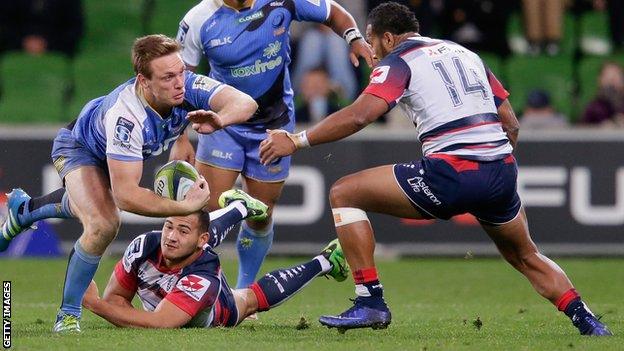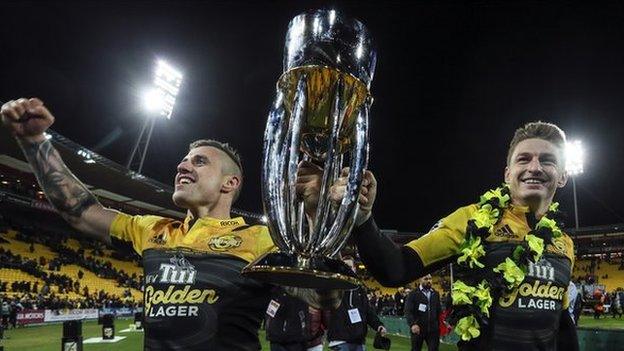Club closure shows rugby's grassroots 'neglected' in Australia - Stirling Mortlock
- Published

Western Force made their debut in 2006 and Melbourne Rebels in 2011
The decision to close down either the Western Force or the Melbourne Rebels is a damning indictment of the state of rugby union in Australia, says former Wallabies captain Stirling Mortlock.
Three teams are set to be cut from Super Rugby, two from South Africa and one from Australia.
Mortlock says it shows the "model is broken" in Australia and criticised the leadership of governing body the ARU.
"Unfortunately it was almost doomed to fail," he said.
The former Brumbies and Rebels centre added on the Rugby Union Weekly podcast: "It's damning. The cost structure and the expense of putting a Super Rugby team out on to the paddock, the numbers don't add up.
"There are so many people that put their hearts and souls into a provincial outfit, so it's a really sub-optimal outcome, and really disappointing."
Super Rugby, which features sides from Australia, New Zealand, South Africa, Argentina and Japan, will scale back to 15 sides from next season, having added three teams in 2016.
Two South African sides and one Australian side will make way.
'Time for Australia to emulate All Blacks'
Mortlock scored more than 1,000 points in his Super Rugby career, twice winning the title with the Brumbies, and has been both a player and a board member at the Rebels.
He feels the ARU's lack of attention to the game at grassroots level has been at the heart of the problem.
"From my perspective I am more concerned about the lack of leadership and direction we have had - or haven't had - from the ARU over the last 10 years," Mortlock added.
"There have been so many decisions that have been made that have led us into the difficult situation where we are now, where we actually aren't expanding, we are reducing our footprint.
"The grassroots have been neglected for too long in Australian rugby. And that's what has contributed to the issues right now. The ARU have stated they need to invigorate the grassroots, and that needs to be the way out.
"I know there are so many people who love rugby, that just don't go and watch anymore. It's about reconnecting with them, their kids, their nephews, their nieces.
"Our women's sevens team have won Olympic gold for the first time ever. There is a great opportunity for us to rebuild - we just need to do it quickly and be smart about it."
And Mortlock hopes the changes will force a comprehensive review of Australian rugby, similar to what happened with New Zealand a decade ago, which led the All Blacks on the path to becoming double world champions.
"The catalyst for New Zealand's global dominance was probably back in 2007, when they were really disappointed with how they performed at the World Cup," Mortlock continued.
"So they had a massive gathering of hearts and minds from across the country, and said 'everything we do from here on in is to make great All Blacks', and they've done that.
"That 'come to Jesus' moment unfortunately has not happened in Australian rugby. We have been fiddling at the edges too often, trying to make little decisions, which haven't actually fixed the problem.
"I hope through this opportunity now, to reduce one team and redistribute a lot of the coaching and playing talent, we can recalibrate and make huge, significant inroads to do very similar to what New Zealand did in 2007. But we've still got a long way to go."
Get all the latest rugby union news by adding alerts in the BBC Sport app.
- Published9 April 2017
